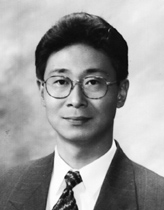Hyung Kook Kim ’85 directs American University’s Center for Asian Studies
Open gallery

“Washington, D.C., is the right place for people like me,” says Hyung Kook Kim ’85, director of American University’s Center for Asian Studies and a 16-year capital denizen. His position—both academically and geographically—affords him unparalleled access to foreign presidents, prime ministers, lawmakers and journalists. “I could not find any better place to pursue my studies.”
From Washington, D.C., Kim studies the affairs of East Asia, particularly those in his homeland of Korea. He mainly explores North Korea’s frosty relations with both South Korea and the United States—relations which he views as stagnant at present, yet bound to improve—in book chapters, articles and symposia. His latest book is The Division of Korea and the Alliance-making Process, published in 1995.
“Hyung Kook is sought after as a speaker at major international conferences,” says Joseph Ha, professor emeritus of international affairs at Lewis & Clark. “He is very active in the scholarly community and is highly respected for his work.”
Kim credits Ha with influencing his decision to depart South Korea for Portland in 1982.
“My uncle, who was a professor of political science in Seoul, South Korea, introduced Dr. Ha to me when he visited Seoul in 1981,” says Kim. “He’s the one who inspired me to come to Lewis & Clark.”
Kim arrived on campus as quite the atypical first-year student: He was 24 years old, had already earned a bachelor’s degree in political science from Korea University in Seoul and had spent the previous three years in the South Korean military to fulfill the country’s mandatory service requirement.
Lewis & Clark, he says, “was a different kind of universe for me,” but it was one to which he quickly warmed. “It was a good experience. I loved the school so much I sent my cousin to Lewis & Clark.”
Kim credits the school’s liberal arts philosophy with improving his analytical skills: “Instead of trying to find one answer to a question, I had the opportunity to compare one answer with another.”
That mindset has served Kim well in the world of academia. After graduation, he moved to the Washington, D.C., area and earned a doctorate from Johns Hopkins University’s School of Advanced International Studies. His dissertation on the international alliance-making process in Korea from 1945 to 1948, notes his mentor, Ha, “was outstanding” and was published.
American University hired Kim as an assistant professor in 1991 and tapped him to lead the school’s center for Asian Studies in 1996. The center promotes understanding of Asia through multidisciplinary programs, student and faculty exchange programs, conferences, public dialogue, research and publications.
In addition to directing the center’s activities, Kim teaches undergraduate courses in U.S.-Japan relations and East Asian politics and teaches graduate classes in Japanese politics and contemporary Korean politics.
“It’s exciting for me,” Kim says of his job. “I meet a lot of people and deal with current issues.” And he’s doing it in Washington, D.C., which is right where he wants to be.
—by Dan Sadowsky
More L&C Magazine Stories
Lewis & Clark Magazine is located in McAfee on the Undergraduate Campus.
MSC: 19
email magazine@lclark.edu
voice 503-768-7970
fax 503-768-7969
The L&C Magazine staff welcomes letters and emails from readers about topics covered in the magazine. Correspondence must include your name and location and may be edited.
Lewis & Clark Magazine
Lewis & Clark
615 S. Palatine Hill Road MSC 19
Portland OR 97219

